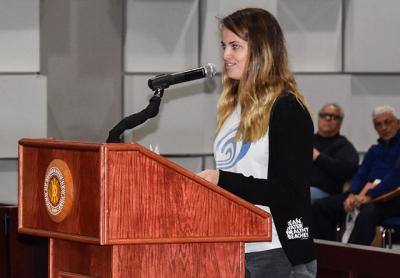Long Island to Zinke: No Drilling Here

Scores of people spoke out against offshore drilling on Long Island at a hearing hosted by Representative Lee Zeldin at Brookhaven Town Hall on Friday.
Prompted by a Trump admimistration proposal to promote oil and gas drilling on 90 percent of the outer continental shelf off the United States, the hearing gave state and local officials, environmentalists, and residents a chance to share their concerns with Department of Interior representatives.
Long Island residents and their representatives had protested that a previous hearing held in Albany was too far away from the people who would be most affected by the plan. Mr. Zeldin, a Republican who opposes the plan along with most other Long Island lawmakers, requested the second hearing.
It was announced just two days earlier, but was well attended despite the heavy wind and rain that accompanied Friday’s northeaster.
Having worked with Interior Secretary Ryan Zinke while the secretary was in Congress, Mr. Zeldin said he thought Mr. Zinke would be willing to reconsider New York’s inclusion in the plan after hearing from Long Islanders. “There is no evidence of these resources even being located off of Long Island,” Mr. Zeldin said. “That alone is reason enough to take Long Island off the table.”
Within five days of Mr. Zinke’s initial announcement, the State of Florida was dropped from the plan. The state’s governor, Rick Scott, cited Florida’s multibillion-dollar tourism industry and other economic impacts such as the threat to hundreds of thousands of jobs. Lawmakers up and down the coast have asked for their states to be removed from the plan for similar reasons.
Those who spoke at Friday’s meeting applied the same tactics. Many, including Assemblyman Fred W. Thiele Jr., emphasized the statewide bipartisan opposition to offshore oil and gas exploration. Many pointed to economic data indicating the billions of dollars generated by Long Island’s coasts. “Our environment is our economy,” Mr. Thiele said.
Those speaking from conservation and environmental groups raised the specter of previous disasters: exploding platforms, birds soaked with petroleum, and contaminated seafood. Several, such as Colleen Henn of the Surfrider Foundation, described the air guns used for seismic testing as disruptive to marine mammals and their ability to communicate, migrate, and find prey.
Speaking for the Citizens Campaign for the Environment, Adrienne Esposito said the residents of Long Island do not live here for the traffic, but for the water. “We consider the water our backyard, our front yard, but we would never consider it our junkyard.” She thanked Kate MacGregor, the deputy assistant secretary for land and minerals at the Department of Interior, the first of two representatives who showed up for the hearing, but asked, “Who are you to threaten it?”
Officials such as County Legislator Bridget Fleming joined their state and county colleagues in urging the department to eliminate the waters off Long Island from the proposed program and to endorse renewable energy efforts instead for the state and region.
According to material shared by Ms. Fleming in a letter addressed to Mr. Zinke, Long Island generates tourism income in excess of $5.6 billion, supporting more than 100,000 employees. “According to a 2016 study by Tourism Economics, over $700 million in state and local taxes is generated annually by Long Island tourism and the average Long Island household would have an annual tax bill increase of $745 without that revenue.”
Assemblywoman Christine Pellegrino, who represents an UpIsland district, questioned the lack of notice for the meeting. “We’re left wondering if the federal government actually wants to hear what we have to say,” Ms. Pellegrino said.
Refusing to yield after her time had expired and the moderator began striking his gavel, Ms. Pellegrino said, “Long Island will not stand idly by while others ruin our coastline.”
After two hours of public comment, Ms. MacGregor addressed the crowd before turning the hearing over to John Tanner, another department representative. Ms. MacGregor thanked them for their boldness in their comments. Responding to the calls for coastal wind energy development made during the hearing, she said that was a shared goal of the department and something it was working on while taking into consideration the concerns that accompany that kind of development.
The public comment period on the offshore oil and gas exploration plan will close Friday. Comments can be submitted to the Bureau of Ocean Energy Management at boem.gov/National-Program-Comment. Ms. MacGregor said the review process is long and will “involve a multitude of comment periods with potentially more meetings when we come to the next step in the program process.”
This article was modified from the print version to correct an editorial modification of the original text. The Trump administration proposal would open the entire United States coastline to oil and gas exploration (not merely the East Coast), with the exception of Florida, which was removed from the proposal five days after it was issued.
